Vote looming, Trump struggles to win Obamacare repeal
However, a number of Democratic representatives are united against the bill

U.S. President Donald Trump attends a meeting with the Congressional Black Caucus Executive Committee at the White House in Washington, DC, U.S., March 22, 2017. PHOTO: REUTERS
Trump has mounted an intensive campaign to garner support for the initiative and the effort is seen by financial markets as a crucial test of his ability to move his legislative agenda, including planned tax cuts, through Congress.
Republican leaders hoped to vote on Thursday but there were signs the deadline could be pushed back. Trump scheduled an 11:30 a.m. ET/1530 GMT meeting with members of the conservative House Freedom Caucus at the White House.
"We're still open for negotiations," Representative Ted Yoho, a member of the conservative group, told CNN. "There is still time."
Democratic Representative Steny Hoyer said the majority Republicans clearly did not have enough votes to pass the bill, which has been championed by House Speaker Paul Ryan.
Trump and Ryan need strong support from their side of the aisle and can only afford to lose 21 Republican votes.
Trump sends holiday greetings to Iranians, does not mention travel ban
As part of his effort, Trump urged Americans in a tweet early on Thursday to press their representatives to vote for the bill, known formally as the American Health Care Act.
Uncertainty over the bill has rattled financial markets and a failure just two months into Trump's presidency would be a setback for the White House, which as late as Wednesday had cautioned there was "no Plan B" for the healthcare measure.
Stocks on Tuesday posted their biggest one-day drop since the Nov. 8 presidential election on concerns about the healthcare drama.
Failure to pass the legislation would cast doubt on Trump's ability to deliver other parts of his agenda that need the cooperation of the Republican-controlled Congress, including ambitious plans to overhaul the tax code and invest in infrastructure.
The House vote had been expected by about 7 p.m. (2300 GMT). But by midnight on Wednesday, lawmakers had not yet settled on the timing of the vote as conservative and moderate Republicans split on whether there should be additional changes to the proposal.
House Rules Committee Chairman Pete Sessions said the vote could happen as early as Thursday or as late as Monday.
Trump, NASA and a rare consensus: mission to Mars
Democratic representatives are united against the bill, which seeks to repeal and replace Democratic President Barack Obama's 2010 Affordable Care Act.
Conservative Republicans have complained the replacement is too similar to Obamacare, and some moderate Republicans are concerned it will weaken health coverage for millions of voters.
An aide to the Freedom Caucus said at one point on Wednesday that more than 25 of its members opposed the plan. The chairman of the group, Representative Mark Meadows, said negotiations late on Wednesday were making headway.
Moderate Republicans huddled late into the evening in Ryan's office. Afterward, Representative Charlie Dent issued a statement saying he could not back the bill.
Trump and fellow Republicans campaigned during 2016 elections on a promise to repeal and replace Obamacare, a program that aimed to boost the number of Americans with health insurance through mandates on individuals and employers, and income-based subsidies.
Their replacement plan would rescind the taxes created by Obamacare, repeal a penalty against people who do not buy coverage, slash funding for the Medicaid program for the poor and disabled, and modify tax subsidies that help individuals buy plans.
The nonpartisan Congressional Budget Office estimated 14 million people would lose medical coverage under the Republican plan by next year. It also said that 24 million fewer people would be insured by 2026.
Even if the legislation passes the House, it faces a second hurdle in the Senate, where a number of Republicans have spoken out against that version.



















COMMENTS
Comments are moderated and generally will be posted if they are on-topic and not abusive.
For more information, please see our Comments FAQ